IX. The Zodiacs
By Hoa Nguyen
I approach the language of the stars as symbolic patterns, and use astrology and other symbolic systems as forms of advanced pattern recognition. Here is the first of four meditations where I work my way through a wheel of influence in groups of threes after the modalities.
The three modalities in astrology are Cardinal, Fixed, and Mutable. They describe how the sign operates.
Cardinal signs initiate action. The Sun's entry into these signs coincides with the equinoxes and solstices. Cardinal signs are direct, assertive, forceful, and enterprising.
Fixed signs stabilize and secure the energy begun by the Cardinal signs. Fixed signs represent determination, power, striving after set goals, pride, and reliability.
Mutable signs adapt and disperse the element. Mutable signs are suggestible, resourceful, flexible, drawn to variety, and move with change.
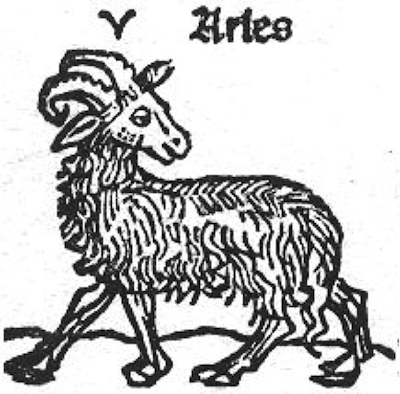
Aries
Cardinal Fire
Ruled by Mars
March 21 - April 20
Tarot: The Emperor
Aries arrives at the start of spring, full of passion. The Aries clan are the fire starters and igniters. I instantly hear (April 9) shouting, "Make life beautiful! Make life beautiful!" while throwing rocks at the "Bad Glazier" in his Paris Spleen.
To meet (April 2) is to feel the fire of her mind, determination, and big-heartedness. She founded the Poetry Project on St. Marks Place, Angel Hair Books, and Naropa University. By example, she inspired me to curate a reading series, start a poetry-publishing venture, and make for poetry. She taught me to be fierce and generous, to stand next to the men in the writing and to take it all on. The Emperor card is all about being at ease with the outer and inner "father"—how to feel at ease and manifest. She wrote, "fire that cleans / fire that catches / fire burns hotter as I go" (Fast Speaking Woman).
More Aries that I want to mention:
(like Waldman, also April 2!): his poem "The Air of June Sings" makes me weep every time. It opens: "Quietly and while at rest on the trim grass I have gazed,/ admonished myself for having never been here/ at the grave-side and read the names of my Time Wanderers."
(April 12) taught me the art and new possibilities of poetic forms at , Summer 1994, in workshop on sonnets via , , , , and . When he writes, "It was good the labor of building a citadel for the muse," I think of this, of sonnets.
(April 18) showed me a way to approach poetry with strategies of sampling, protest, strangeness, jazz, and blues. "At once I am there at the great sun, feeling the great sun of the center. Hearing the Lorca music in the endless solitude of crackling blueness."
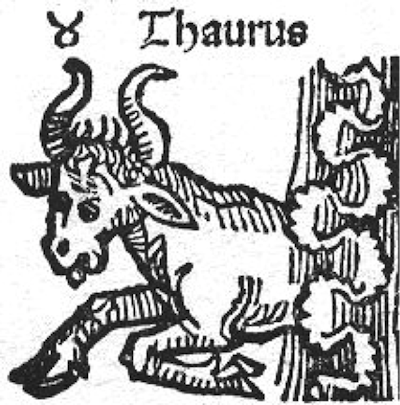
Taurus
Fixed Earth
Ruled by Venus
April 21 - May 21
Tarot: The Hierophant
Taurus connects to the material realm, bringing ideas and communications into form. It's not surprising that wrote in the language of flowers and in the voice of flowers; Taurus connect strongly to the earth and make excellent gardeners. Steadfast, they are not afraid of work and have tremendous focus. As makers, they render things solid; like the Hierophant, they bridge between the spirit world and the physical world.
My teacher at New College of California San Francisco, (May 17), made bridges for me between poetry and prose (notably in her class on ) and between poetics and theory (she taught us contemporary theory in a series she named The Language of Paradise). She also bridged communities, introducing writers from her students at Berkeley with those of us at NCOC, creating opportunities for rich exchange.
I love Bernadette Mayer (May 12)'s where she writes smartly and wistfully on the Taurean love of farming. It ends "Steadfast as any farmer and fixed as the stars Tenants of a vision we rent out endlessly." I wrote a poem for Mayer called "Thinking of Bernadette" because I was thinking about money all day and Mayer is often concerned with the matter of money—very Taurus.
Back in 1997, I think, I sent (April 27) a copy of my chapbook Dark with a letter where I mention that I'd soon be in New York City. He wrote back a page-long response inviting us to brunch with tickets as his guest to the opera Lizzie Borden, for which he was the librettist. A generous Taurus artist, he is gifted in collage and the poem-song. From his poem-song "No Liquor in the House":
Lizzie Murder Music included,
cue accident. Loose teeth
(long run) affordable.
Affable Ishy, handsome rambler.
Despite familial dread (plot)
stuck with bus & burb Macheath.
Prissy? He clarifies butter!
Death Breath time scrambler.
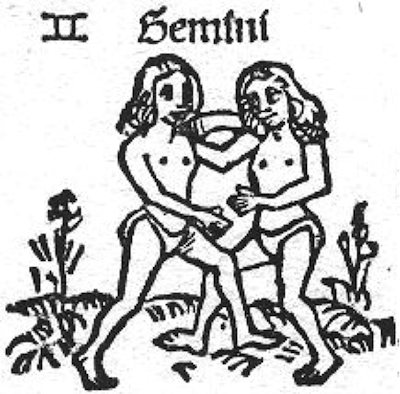
Gemini
Mutable Air
Ruled by Mercury
May 22 - June21
Tarot: The Lovers
I'm in love with (June 5)'s duende. Muse as angel and daemon. It would take a mercurial Gemini to name the fire-earth-blood spirit that allows us to translate messages from elsewhere in the process of making. Depicted as the trump card The Lovers in the tarot, it's the archetype of union with supposed opposites, soul work through union, struggle, and love.
"Do I contradict myself? Very well, then I contradict myself. I am large, I contain multitudes." (May 31), the independent self-publishing poet, has the expansive, effusive traits of a Gemini.
Known as both scholar and poet, manages the multitudes neatly. Whenever I teach Stein (an airy Aquarius like me) and (fiery Sagittarius) together, I include her book My Emily Dickinson as the seam that binds them together. In her introduction she writes:
In the college library I use there are two writers whose work refuses to conform to the Anglo-American literary traditions these institutions perpetuate. Emily Dickinson and Gertrude Stein are clearly among the most innovative precursors of modernist poetry and prose, yet to this day canonical criticism from Harold Bloom to Hugh Kenner persists in dropping their names and ignoring their work. Why these two pathfinders were women, why American--are questions too often lost in the penchant for biographical detail that "lovingly" muffles their voices. One, a recluse, worked without encouragement or any real interest from her family and her peers. Her poems were unpublished in her lifetime. The other, an influential patron of the arts, eagerly courted publicity, thrived on company, and lived to enjoy her own literary celebrity. Dickinson and Stein meet each other along paths of the Self that begin and end in contradiction. This surface scission is deceptive. Writing was the world of each woman. In a world of exaltation of his imagination, feminine inscription seems single and sudden.
Howe's ability to join two very different writers—and to move between scholarship and poetry (and somehow to unite them into one), seems the essence of the Gemini's ability to unify the moving mind.
(June 3) used the messenger aspect of Gemini as consummate promoter of poetry. Gemini, the great talker of the zodiac, also can be seen as the psychopomp Hermes/Mercury, who conversed with the dead. Ginsberg conversed with dead poets such as Whitman and . Conductor of souls, Ginsberg performed his , writing, "I've been up all night, talking, talking, reading the Kaddish aloud, listening to Ray Charles blues shout blind on the phonograph/ the rhythm the rhythm—and your memory in my head three years after—And read Adonais' last triumphant stanzas aloud—wept, realizing how we suffer."
Cancer
Cardinal Water
Ruled by the Moon
June 22 - July 21
Tarot: The Chariot
What do writers Walter Benjamin, Marcel Proust, , and share in common? They were all born under the sun sign of Cancer. Cancer born people are moody, protective, empathetic, nostalgic, loving, cautious, and imaginative. They tend to form a protective layer for retreat and renewal (in addition to the Crab, other animal symbols for Cancer include the Turtle)—sometimes I think that the Cancer writer uses language as an apparatus in which to retreat, renew, and spin a pearl around an irritant.
The Cancer poet's "shell" also seems symbolic of the self-containment of this sign, one that signifies "home"—they tend to create and carry their home with them wherever they go, inside the text. Naturally, the tarot trump card the Chariot also speaks of movement, especially toward "home."
In the summer of 1994, I was a graduate student on scholarship to ; one of the weeks, I attended a workshop lead by (July 1). It was a class that focused on writing strategies. She generously spoke of her writing process to the poems that would appear in her book Muse & Drudge. In response to her direction, we made "restricted word pools" (a name I made up for this strategy, later) where we were asked to redact the letters that make up a word, to restrict our vocabulary so that those letters did not appear in generating the descriptive or associative words. As I relate this now, I find it rather funny to recall that I chose the word STAR in order to write about the notion of "stars" in response to this challenge. Mullen's poems, methods, and teaching remain with and inspire me decades later.
In a 1996 letter-exchange , Mullen writes:
It would be fair to say that lines like "divine sunrises/Osiris's irises/his splendid mistress/is his sis Isis" strike the reader as something close to pure word-and-sound-play, but this verse also alludes to the project of Afro-centrism. Even a relentlessly language-centered quatrain like "mutter patter simper blubber/.../mumbo-jumbo palaver gibber blunder" is intended to comment on the loss of indigenous languages of enslaved Africans, while its recurring sound patterns also suggest homophones of kinship terms mother father sister brother, thus setting up an analogy between loss of language and loss of kinship. Similarly, the admittedly nonsensical lines "marry at a hotel, annul em/nary hep male rose sullen/let alley roam, yell melon/dull normal fellow hammers omelette" play on my own name, Harryette Romell Mullen, by echoing and scrambling the phonemes sounded in the name.
Loss of original language and the textual return by way of language reformation: In her poems, Mullen shows us how to expose a fracture and enact a re-assemblage of retrieval. From Mullen I learned a kind of "coming back home" in language: how to put Osiris's pieces back together.
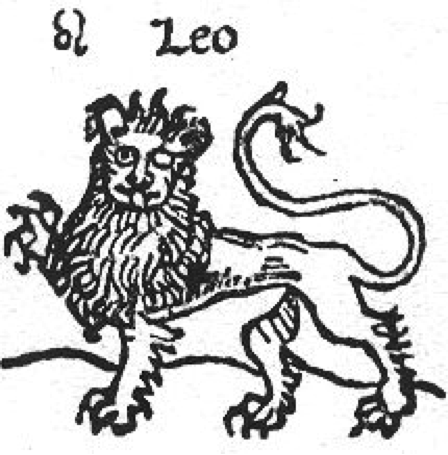
Leo
Fixed Fire
Ruled by the Sun
July 22 – August 22
Tarot: Strength
(August 4) and (July 28) do their poetry roaring as Leos. My 10 year old son Waylon likes to quote (August 1)'s roaring as Moby Dick's Ahab "..from hell's heart I stab at thee!.."
In terms of anatomy, the sign of Leo corresponds to the heart. They are known as big hearted (lion-hearted, if you will) as well as generous, hospitable, caring, warm, authoritative, active, and open.
When you meet (August 6), you feel her Leo power. She is warm and she is fierce. I remember and I first meeting Diane di Prima in Japan Town for lunch twenty years ago. She told us of her correspondence with and how she visited him when he was incarcerated at St. Elizabeth's. She shared her experience with starting a poet's theater in New York. We asked her questions about the magazine she founded with , The Floating Bear, how they managed that enterprise, and the influence and reach of the journal (Floating Bear later became the model for own imprint and journal Skanky Possum). Her life as an artist and mother inspired me and allayed my fear that it was impossible to be both simultaneously. A masterful teacher, she taught hermetic traditions for poetry at New College of California in the 80s and over lunch (often sushi) she would suggest book titles to us such as Gertrude Rachel Levy's The Gate of Horn: A Study of the Religious Concepts of the Stone Age, and Their Influence upon European Thought. Meeting with her meant receiving a transmission of poetry lineage; it always felt "important."
On the Rider Waite deck, the Strength card is shown as a regal woman gently but masterfully opening a lion's mouth; it symbolizes peaceful strength and powerful self-discipline. A card of transformation, it suggests the capacities of dealing with difficulty "head on."
I think of the queen of the Strength card when di Prima writes "i am a woman and my poems/are woman's ..."
ROAR.
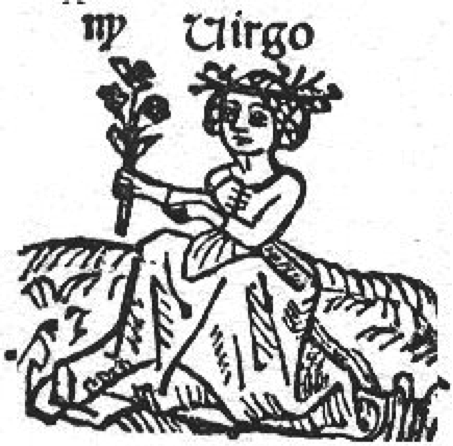
Virgo
Mutable Earth
Ruled by Mercury (like Gemini)
August 23 – September 23
Tarot: The Hermit
I asked my Virgo friend the painter how I might I visualize Virgos, the Virgins, as mutable earth? He said to think of molten lava: earth dispersed, earth in motion, earth that can make new islands.
Virgos see the whole picture and they see the small things. They are the critics of the zodiac; they are tireless workers and make good editors and proofreaders. If the Virgos in my life were to read this, they would calmly tell me that I didn't mention the many Virgos that I could have mentioned in my wheel of personal influence, such as (August 31), (September 6), (August 30), and (September 14). Sadly, I cannot catalogue them all, as I'm not as perfectly indefatigable as you, Dear Virgo.
Virgos observe patience toward efforts—they can plant the seed and nourish it to fruit (unless they go volcano in their mutable way). I think it's funny that they don't have their own planet of influence—it is as though they are self-contained and mostly unknowable.
I think of ability to work as an obstetrician, poet, and critical prose writer as very Virgo. Looking at his earthy attention to asphodel ("that greeny flower") as way to speak of love and its complications with organized mimetic tercets, I notice certain Virgo themes:
I had a good collection.
The asphodel,
forebodingly,
among them.
I bring you,
reawakened,
a memory of those flowers.
They were sweet
when I pressed them
and retained
something of their sweetness
a long time.
It is a curious odor,
a moral odor,
that brings me
near to you.
The patient precision of collecting and pressing a certain type of flower—ones that go from sweet to a "moral odor"—echoes the Virgin/Virgo meticulousness. One wouldn't be inclined to call the poem "romantic"—and yet there's an aching vulnerability of a speaker who is trying to let their Beloved see them at last, truly.
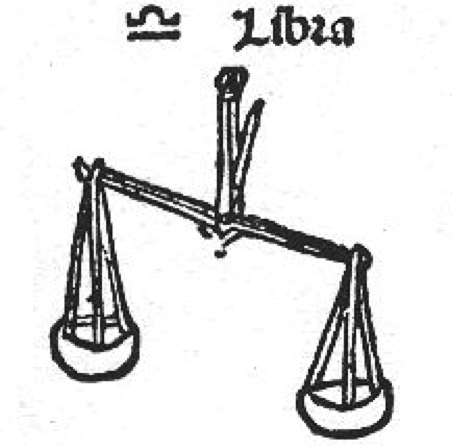
Libra
Cardinal Air
Ruled by Venus
24 September – 23 October
Tarot: Justice
Libras are known for their love of beauty and their need for balance, justice, and fairness.
I always think of Libras as "kissed by Venus." Poet was born at the start of Libra (September 24) so it's no wonder he invokes Aphrodite when he writes:
That light suffusing mist is thee, pardner,
hot-hipped and sore all about
from Aphrodite's lucidest negotiations.
All flesh wants you because your mind.
Libra, like all air signs is about the mind, the mental faculties, strategies, decisions, and language. Libras make good lawyers; they are the conscience of the zodiac. Like the Justice card in tarot, their motto is "I weigh."
was born right in the middle of Libra (October 7). This placement confers a kind of seeking and finding of principles to live by and treasure. It also lends a particularly Libran trait of seriousness balanced with humor, as witnessed in this Baraka poem:
I think of (October 20) as having that Libran language mind. Of his poems, he once wrote "This poetry is a picture or graph of a mind moving, which is a world body being here and now which is history . . . and you." He takes influence from two very different poets, but in equal measure: (who he read when he was in the Army at the end of WWII) and (who was a visiting poet when he was at Reed College). Drawing from both, this could be seen as an act of balancing and weighing.
Last August in preparation for my writing workshop featuring the collected works of Philip Whalen, I dreamt that a young Phil Whalen and I were doing research in an archive—then we retired to his kitchen. His stovetop was rustic with whimsical attachments that he could use to pour water into pans; he was making us bacon. And he told me that he was willing to pour someone a glass of juice but that they would have to come and get it from him. He said it was most important.
That seemed like a beautiful metaphor for Whalen and his poems and the (somewhat passive) generosity and fairness of Libras—Whalen has some juice; he's already poured it; we just need to come and get it from him.
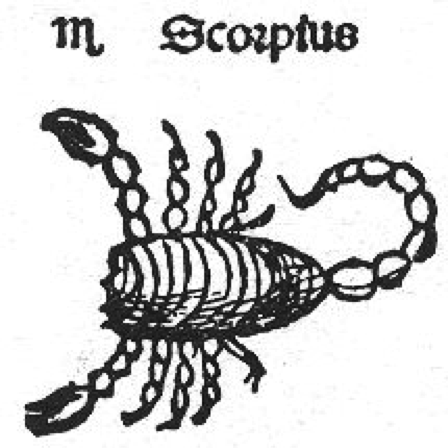
Scorpio
Fixed Water
Ruled by Pluto
October 24 – November 22
Tarot: Death
"I am certain of nothing but the holiness of the heart's affections and the truth of the imagination." —Scorpio (October 31)
I live with the poet ; he happens to be a Scorpio (November 3). Whenever we talk stars and poetry, we marvel at the significant number of influential Scorpio writers that belong in his clan. These include Keats, (October 30), (November 15), (November 19), (November 8), (November 9), and (November 12—who died on her birthday with a book in her hand).
Scorpios are known for their ability to shed skins and rebirth. They are often described as intense. They feel deeply and they are as focused and stubborn as any fixed sign.
It's difficult to choose a single Scorpio as there are so many writers here I love. Ted Berrigan is on my mind as I'm teaching a writing workshop over the summer of 2014 where we read and write through his Sonnets.
In The Sonnets I see a Scorpionic construction of self, one that can be read as deeply interior as well as inhabiting spaces and times outside of the poet and his time. Informed by love and art, Berrigan takes up Keat's certainty in "the holiness of the heart's affections and the truth of the imagination," even as he pokes fun at Keats in the Sonnets with his mischievous lines that end Sonnet XXI:
I thought about all those radio waves
Keats was a baiter of bears
Who died of lust (You lie! You lie!)
And the wind goes there
We see this reference to "wind" as a returning theme ( ends "Wind giving presence to fragments."). It recalls breath, the life force; it is the "spir" or spirit and stands inside of inspiration: to breathe in. The state of amusement ("turning your muses on" as Berrigan has said) has a place in the act of creation. The Sonnets construct a life through art and by the virtue that we love, but like Keat's , Ted Berrigan's self or I "is a correspondent." The poems are like those of all of the Scorpio clan: "feminine, marvelous, and tough."
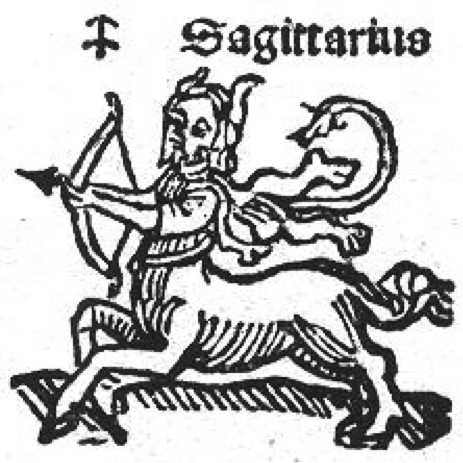
Sagittarius
Mutable Fire
Ruled by Jupiter
November 23 – December 21
Tarot: Temperance
Mutable comes from Latin, mutabilis: change, the breakdown before the breakthrough. Sagittarians are half in the human world, half another, and embody innovative synthesis. Some poets under this sign include (December 2), (December 10), and (December 13).
It's only fitting that I started writing this entry while riding public transit; Sagittarians have a love for movement and travel. I often say that Sagittarians have a "wandering foot." Adam began in Scotland and ended up in San Francisco; Patchen started in Ohio, lived in New York City, and finally also moved to San Francisco. But the poet that I'm going to focus on is Dickinson, a poet who traveled not in body so much as in letters and poems.
Emily Dickinson was a prolific letter writer. A thousand survive; it is believed that these are only about one-tenth of the letters Dickinson actually wrote. In the second of the so-called "Master Letters," she wrote:
I wish I were great, like Mr. Michael Angelo, and I could pain for you. You ask what my flowers said—then they were disobedient—I gave them messages. They said what the lips in the West, say, when the sun goes down, and so says the Dawn.
I'm drawn to unusual use of the word pain in the phrase "I could pain for you" and the ruffled syntax of "You ask what my flowers said—then they were disobedient—I gave them messages." It's almost as if her em dashes are centaur arrows, moving, moving, moving the sense forward, the breakdown before the breakthrough.
When I read her very mutable-sign line "," I think of the Temperance card and it's relationship to Sagittarius. This tarot card signifies meaningful connections and the themes of harmony, adaptation, and "rhythmic patterning." Like her poems, it embodies movement and blending. If you look at the poem that opens "Split the lark—and you'll find the music." you can find her sifting through language this way, at the level of the letter. Notice here how the letter L drifts through the language of the poem:
split, lark, you'll, bulb, silver, rolled, scantily, dealt, lutes, old, loose, flood, shall, scarlet
I think of this when Dickinson writes, "Pulling syllable from sound."
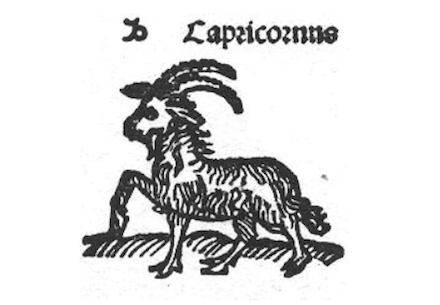
Capricorn:
Cardinal Earth
Ruled by Saturn
December 22 – January 20
Tarot: The Devil
Like all earth signs, Capricorns are known to be practical, dedicated, and industrious. Capricorns are also known for their ambition and leadership abilities (this is a common aspect of the Cardinal nature).
For this clan, I will focus on two Capricorn poets that knew and influenced each other, (December 27) and (January 7).
When Olson and Duncan met for the first time in 1947, Duncan was delighted to find that they both were interested in the Greek idea of temenos:
I was interested in totally coordinating a time-space picture of the Earth, then zeroing in at some point of it, and so was he", Duncan has recalled. "That day I talked to him about the economic relation of cities to the surrounding landscape. It turns out he'd been thinking about the same thing himself... He wanted to know about the Greek idea of temenos, which I explained to him. He'd just been back to Gloucester, talking to the fishermen. Even then the question of what it means to have a sacred place or precinct obviously interested him. And of course it would be the question for him—the whole problem of how to cultivate one's own locality into writing.
—from The Allegory of a Poet's Life, a biography of Charles Olson by Tom Clark, page 126.
I find it interesting that temenos also resonates with Jungian thought referring to the sacred place where the unconscious can roam freely as with dreaming. Temenos is figured as the "circle in the square," like a picture of the spirit of existence ("soul" cross-culturally depicted as a circle or wheel) inside of place—a square as the "four cornered earth": the points in the sky with respect to where the sun rises for the winter and summer solstice and the spring and fall equinoxes.
I love this poem by Olson that features dreams, Duncan, and an earthy gem situated squarely in the human occupation of place (from The Maximus Poems):
I am the Gold Machine and now I have trenched out,
smeared, occupied
with my elongated length the ugliest passage of all the V
running from the Rest House down the hill to the
Tennis Court, the uncontaminated land which of all Stage
Fort
does not bend or warp into new expressions
of itself as De Sitter imagined the Universe a
rubber face or elastic bands falling
into emergent lines from which string the crab-apple
tree is a dollyop on the lawn of the Morse house over
Western Avenue
Through the gate in a door of a cell
inside which about where the Rest House is another man
and I were I had then in my hand a wooden page or block
of which a long red drop and I wished
so strongly to show right away to Robert Duncan
and another who were walking away down the V and shot it
into the space of the door which it exactly fitted
and they turned, and saw it, and went on and taking
the block out of the window stuck my fingers vertically
through the same hole or grating and waved by moving
my fingers at them where they were towards the
Tennis Courts
The land was relieved. I had drawn my length all this way
and had covered this place too
In Olson's "," he speaks of Composition by Field "where all the syllables and all the lines must be managed in their relations to each other." This compositional model would influence Duncan's poetry appearing in his book The Opening of the Field. Here is Robert Duncan in a lecture on Charles Olson's poetics at New College, San Francisco 17 February 1982:
(Olson) had the term Field Composition which I'd seen before and thought about in relation to paintings because the Gestaltists had advanced the idea of the Field Composition of paintings—that intention does not move pointedly around a painting—that the eye actually rediscovers the painting with different paths—and you look at a painting somehow entire and look deep into it—and then the great question came up right away for the Gestaltists: don't we read the same way, scan the entire area we're reading, and then read into it, so that we're already in an advanced state of recognition without much time passing at all as we discover it, but the discovery comes from a Field Scan of the whole area.
Composition by Field is a procedural acknowledgement to how, as readers, we encounter sense nuggets in a Gestalt; that is, in arrays or patterns—certainly not as letters, syllables or event sense chunks, but as one might apprehend a painting, the eye taking in and processing the visual field as parts of a whole. I love that it takes two earth sign to relate writing to a "field."
I shall depart from the Capricorn clan with the opening movement of a poem from Duncan's Opening of the Field that speaks to the sense of temenos...
""
as if it were a scene made-up by the mind,
that is not mine, but is a made place,
that is mine, it is so near to the heart,
an eternal pasture folded in all thought
so that there is a hall therein
that is a made place, created by light
wherefrom the shadows that are forms fall.
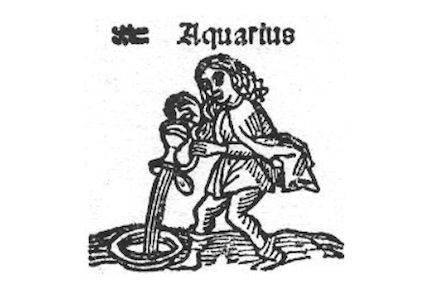
Aquarius
Fixed Air
Ruled by Uranus
January 21 – February 19
Tarot: The Star
Aquarians are known to be inventive thinkers, "ahead of their time," and eccentric. They are the "mad scientists" of the zodiac with brilliant, quirky, and analytical mind. As the water bearers, they love giving idea-gifts that they think are a boon to humanity. It's no wonder that as we entered the "Age of Aquarius," we have experienced advancing and ever-more-rapid methods of communications that are designed to bring human beings closer to each other (and which ironically, may serve to isolate us further from each other—perhaps a sidelong reflection of the notorious Aquarian "aloofness"?). Their catch phrase is "I know..." Also, hairstyle: they say that the dead giveaway for Aquarians is their hair flair.
(February 3) was such a classic Aquarian: original, unusual, and genius. When heard Stein read in the US in 1933, he remarked that her language was "smashing every connotation that words ever had in order to get them back clean." Like many Aquarians, Stein was focused and experimental. Stein on her writing:
Every word I write has the same passionate exactness of meaning that it is supposed to have. Everything I write means exactly what it says.
This passage reminds me of her relationship with the philosopher (a fellow Aquarian who she read and with whom she was friends) and of his writings on :
Process philosophy is characterized by an attempt to reconcile the diverse intuitions found in human experience (such as religious, scientific, and aesthetic) into a coherent holistic scheme. Process philosophy seeks a return to a neo-classical realism that avoids subjectivism. This reconciliation of the intuitions of objectivity and subjectivity, with a concern for scientific findings, produces the explicitly metaphysical speculation that the world, at its most fundamental level, is made up of momentary events of experience rather than enduring material substances. Process philosophy speculates that these momentary events, called "actual occasions" or "actual entities," are essentially self-determining, experiential, and internally related to each other.
For this segment, I want to interview the late (January 30), a poet who was known to invent poems for, by, and with ghosts.
Hoa Nguyen: Hi Jack; I hope it's okay to call you Jack? I'm also a January Aquarius, by the way! Anyway, I'm wondering if you could tell me a little bit more about your statement, "Poetry—a machine to catch ghosts"
Jack Spicer: I like the idea (Aquarians always LOVE ideas) that there are these big eternal shapes that lie outside of us. Why do you think I chose Lorca as a correspondent? He was so dead and yet so alive! Didn't he say "A dead man in Spain is more alive when dead than anywhere else on earth"?
I'll say it again: nothing matters except the big lie of the personal—the lie in which these objects do not believe—and the encysted emotion will itself become an object to be transferred at last into poetry like the waves and the birds. By making poems into ghost catching machines, we'll finally realize invented particularities.
HN: Is that what you mean by "a kind of magic, kinded them"?
JS: Yes, exactly, and also:
"yestestday"
"oldnesses"
"esstoneish me"
"ununderstanding"
"chill-dren"
HN: Inventiveness! This reminds me of how poetry means, at its etymological root, to make.
When you wrote "The heart's a sprinting thing and hammers fast" did you lay it down as iambic pentameter from the first draft, or did you revise the rhythm so that it would be the 'dum DAH' of a heartbeat? It seems that even when your poems are not personal per se, they are poignant.
JS: Well you remember that phrase in the Shakespeare sonnet (you quote it so I know you know it): "Was it his spirit, by spirits taught to write"? Any attuned poet can write out of the heartbeat because we listen to that for 9 months inutereo—and it courses ever after. And if you read enough and you listen hard enough the rhythms follow the movement of words. I've said it before so I won't be boring: I transmit messages from elsewhere. I'm a capacitor for received language. I don't know where it comes from. No one does.
HN: I once had someone give me a kind of psychic reading. She told me that I had many spirits around me and that sometimes when she reads for people, the spirits beg her to tell the person about their existence. Not mine. Mine loved me—told her that I "take great dictation."
All of this reminds me of an (he's another air sign, a Libra); he's accepting the Prince of Asturias Letters Award and says:
Poetry comes from a place that no one commands, that no one conquers. So I feel somewhat like a charlatan to accept an award for an activity which I do not command. In other words, if I knew where the good songs came from I would go there more often.
Do you sometimes feel like a charlatan?
JS: Maybe at this juncture I would write LOL? LOL! Well this word, charlatan, sent me to the etymological dictionary by T. F. Hoad:
Charlatan, mountebank; quack; pretentious imposter... f. ciarlare babble
HN: I don't find you to be a babbler at all; I think you are being too modest. When I look up mountebank in Hoad I find that it is related to "juggler"—a playful and mercurial (air-sign-related) figure who keeps things moving. Like the fool, a kind an elfish playfulness: I think of you as keeping things aloft in that way, in the way of retrieving messages—keeping words in motion.
JS: Well, I do think "babble" in the way that I purposely want to align with something essential and numinous (as in when I write "poet be like God")—or maybe I mean aligned with the big GOD and not the later patriarchic "God." Things do not connect; they correspond.
HN: Skeat says babble is from the M. E. babelen, to prate, mumble, chatter... "to keep on saying 'ba, ba' syllables imitates a child's attempts to speak"
JS: Yes, you start with a syllable machine and see what ghosts you catch. By the way, which do you prefer, Hoad or Skeat?
HN: I prefer both Hoad and Skeat!
[The correspondence descends into geeky Aquarian etymological and classical dictionary chatter...]
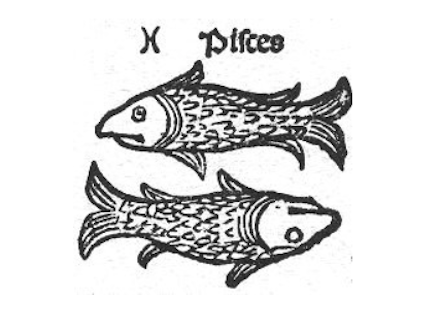
Pisces
Mutable Water
Ruled by Jupiter and Neptune
February 20 – March 20
Tarot: The Moon
I always think of Pisces as half-off-the-planet. Apparently, there are more astronauts and dancers that are Piscean than any other sign. They are drawn to inhabiting other worlds and are often interested in mysticism, spirituality, or anything "out of this world." Pisces have formidable psychic abilities and are extremely intuitive. They are also incredibly emotionally sensitive.
It seems fitting that the tarot card that represents Pisces is the Moon; it is the symbol of the imagination giving form to creative energy. The card also recalls the Piscean other-worldliness. It is the figure of Pisces as crossroads, as being in threshold. As allusiveness, their energy is that of a great mirror, open and receptive.
Highly creative and imaginative, Pisces are often considered the sign of the poet. The egoless nature of Pisces predisposes them, I think, to be poets, as (a fellow water sign) writes:
A Poet is the most unpoetical of any thing in existence; because he has no Identity—he is continually in for—and filling some other Body.
Two Pisces poets I'd like to consider first were teachers and mentors.
Gloria Frym (February 28)'s devotion to poetry both as a writer and scholar continues to inspire me (see this comparative essay on ). When I think back to her teaching, the thing I recall the most was how she seemed to somehow get out of the way while also very clearly leading. With her as teacher and mentor, new discoveries and connections felt natural and intrinsic. She showed me that it is possible to be a woman, teacher, an artist, and a parent. She taught me how to edit and create a poetry journal; she taught me sound pedagogy for a creative writing workshop. A student of s, she helped me form my poetry lineage.
Speaking of poetry lineage, I owe much to the poet, scholar, biographer and educator (March 1). I remember when I walked into my first graduate class; it was Clark's seminar on . I took every class he offered thereafter: on John Keats, on , , and , on Charles Olson, as well as a collaborative sonnet workshop. He continues to instruct through his blog . As a poet, his Piscean ability to exit himself and inhabit another body can be seen in his books Empire of Skin (an epic poem on the history of fur trade in the Pacific Northwest beginning with the 18th century) and Junkets on a Sad Planet (a biography in verse on the life of John Keats, some voiced as if coming from Keats himself—a stunning and moving collection).
Finally, I'd like to speak to (March 4)'s most acclaimed book Dictee. I find its complexity and slipperiness displays the Piscean ability to diffuse, combine, and channel. As writes on Dictee "[Cha has an] extraordinary sensitivity to the struggle and meaning of acquiring language and attempting its transformative use in a culture which marked her—the speaker—as marginal." From Dictee:
She moves slowly. Her movements are made gradual, dull, made to extend from inside her, the woman, her, the wife, her walk weighted full to the ground. Stillness that follows when she closes the door. She cannot disturb the atmosphere ...
Upon seeing her you know how it was for her. You know how it might have been. You recline, you lapse, you fall, you see before you what you have seen before. Repeated, without your even knowing it. It is you standing there. It is you waiting outside in the summer day. It is you waiting and knowing to wait. How to. Wait. It is you walking a few steps before the man who walks behind you. It is you in the silence through the pines, the hills, who walks exactly three steps behind her. It is you in the silence. His silence all around the unspoken the unheard, the apprenticeship to silence. Observed for so long and not ending. Not immediately. Not soon. Continuing. Contained. Muteness. Speech less ness.
The book figures a confluence of language, identities, and forms. Everything is in motion; the text mixes and permutates. We find translation lessons, Catholic catechism, documents, photos, and movie stills. There are charts, handwriting, letters, and translations. To me, Dictee embodies the Piscean egolessness and their ability to adapt, escape, innovate, and mutate. As the writing includes, it erases. As it identifies, it defies coherence.
Bạn đang đọc truyện trên: Truyen247.Pro